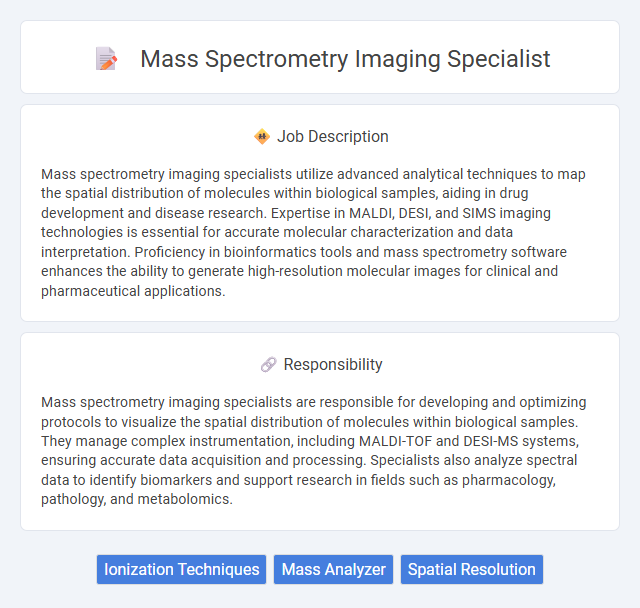
Mass spectrometry imaging specialists utilize advanced analytical techniques to map the spatial distribution of molecules within biological samples, aiding in drug development and disease research. Expertise in MALDI, DESI, and SIMS imaging technologies is essential for accurate molecular characterization and data interpretation. Proficiency in bioinformatics tools and mass spectrometry software enhances the ability to generate high-resolution molecular images for clinical and pharmaceutical applications.
Individuals with strong analytical skills and a passion for detailed laboratory work are likely suitable for a Mass Spectrometry Imaging Specialist role, where precision and patience are essential. Those comfortable working with complex instrumentation and interpreting intricate data may find this job rewarding and fitting. However, individuals who prefer fast-paced, less technical environments might struggle with the specialized demands of this position.
Qualification
Expertise in analytical chemistry and experience with mass spectrometry imaging (MSI) techniques are essential qualifications for a Mass Spectrometry Imaging Specialist. Proficiency with software tools for data acquisition, processing, and visualization, such as SCiLS Lab, HDI, or similar MSI platforms, supports accurate molecular spatial distribution analysis. A strong foundation in biochemistry or molecular biology combined with hands-on laboratory experience ensures effective sample preparation and interpretation of complex imaging results.
Responsibility
Mass spectrometry imaging specialists are responsible for developing and optimizing protocols to visualize the spatial distribution of molecules within biological samples. They manage complex instrumentation, including MALDI-TOF and DESI-MS systems, ensuring accurate data acquisition and processing. Specialists also analyze spectral data to identify biomarkers and support research in fields such as pharmacology, pathology, and metabolomics.
Benefit
Mass spectrometry imaging specialist roles likely offer significant benefits including advanced skill development in high-resolution analytical techniques and hands-on experience with cutting-edge instrumentation, enhancing career prospects in pharmaceuticals and biomedical research. These positions probably provide opportunities for interdisciplinary collaboration, fostering innovation and expanding professional networks. Competitive salaries and access to continuous learning resources may further contribute to long-term job satisfaction and career growth within this specialized field.
Challenge
Mass spectrometry imaging specialists likely face challenges in optimizing complex datasets to achieve high-resolution molecular maps. They probably need to troubleshoot instrument configurations and sample preparations to enhance signal accuracy. Balancing data interpretation with practical laboratory constraints may often test their analytical and problem-solving skills.
Career Advancement
Mass spectrometry imaging specialists can advance their careers by gaining expertise in cutting-edge imaging techniques and data analysis tools, enhancing their ability to interpret complex molecular distributions. Pursuing advanced degrees or certifications in analytical chemistry, bioinformatics, or related fields significantly increases opportunities for leadership roles and research positions. Building a strong publication record and collaborating on interdisciplinary projects also facilitates progression into senior scientist or management roles within academic, pharmaceutical, or biotech industries.
Key Terms
Ionization Techniques
Mass spectrometry imaging specialists leverage advanced ionization techniques such as MALDI (Matrix-Assisted Laser Desorption/Ionization), ESI (Electrospray Ionization), and DESI (Desorption Electrospray Ionization) to precisely analyze spatial distribution of biomolecules in tissue samples. Expertise in optimizing ionization parameters directly impacts the sensitivity and resolution of molecular imaging, enabling detailed characterization of lipids, proteins, and metabolites. Proficiency in these ionization methods supports high-throughput imaging pipelines crucial for applications in biomedical research and pharmaceutical development.
Mass Analyzer
Mass spectrometry imaging specialists leverage advanced mass analyzers such as time-of-flight (TOF), orbitrap, and quadrupole to generate spatially resolved molecular profiles in complex biological samples. Expertise in optimizing mass analyzer parameters enhances resolution, accuracy, and sensitivity, enabling precise identification of metabolites, proteins, and lipids. Proficiency with high-resolution mass analyzers facilitates detailed chemical mapping critical for applications in pharmaceutical research, biomarker discovery, and clinical diagnostics.
Spatial Resolution
A Mass Spectrometry Imaging Specialist focuses on enhancing spatial resolution to achieve precise molecular localization within tissue samples. Expertise in optimizing instrument parameters such as laser spot size and matrix application methods directly impacts the quality of spatially resolved chemical images. Mastery in data processing algorithms further refines spatial resolution, enabling accurate interpretation of complex biomolecular distributions.
 kuljobs.com
kuljobs.com